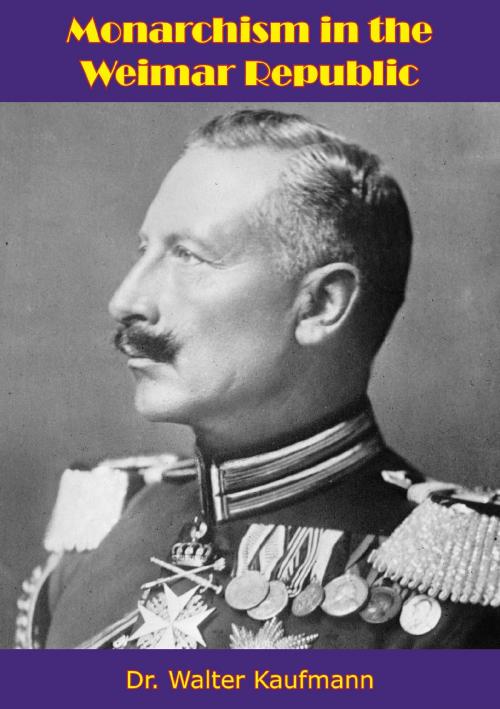Monarchism in the Weimar Republic
Nonfiction, History, Germany, European General, Military, United States| Author: | Dr. Walter Kaufmann | ISBN: | 9781789121087 |
| Publisher: | Arcole Publishing | Publication: | March 12, 2018 |
| Imprint: | Arcole Publishing | Language: | English |
| Author: | Dr. Walter Kaufmann |
| ISBN: | 9781789121087 |
| Publisher: | Arcole Publishing |
| Publication: | March 12, 2018 |
| Imprint: | Arcole Publishing |
| Language: | English |
“The present essay is a pragmatic study of monarchism as a political factor in Germany during the period of the Weimar Republic. It seeks to illuminate the history of that period by concentrating on the most powerful opposing force with which the democratic republic in Germany was confronted during the major part of its existence. It also aims at an answer to the question why the fall of the Weimar Republic did not bring about a restoration of the monarchy but, on the contrary, destroyed monarchism together with democracy.
“In tracing monarchism during the Weimar Republic, we shall distinguish two main periods. During the first, until 1923, monarchism was the core of a violent rightist opposition to the republican form of government. During the second, from 1923 to 1933, monarchism adopted a more moderate policy. It became an oppositional movement in the republican state in whose government it participated at various times, while it gradually became outflanked by a non-monarchistic rightist movement—National Socialism.”
“The present essay is a pragmatic study of monarchism as a political factor in Germany during the period of the Weimar Republic. It seeks to illuminate the history of that period by concentrating on the most powerful opposing force with which the democratic republic in Germany was confronted during the major part of its existence. It also aims at an answer to the question why the fall of the Weimar Republic did not bring about a restoration of the monarchy but, on the contrary, destroyed monarchism together with democracy.
“In tracing monarchism during the Weimar Republic, we shall distinguish two main periods. During the first, until 1923, monarchism was the core of a violent rightist opposition to the republican form of government. During the second, from 1923 to 1933, monarchism adopted a more moderate policy. It became an oppositional movement in the republican state in whose government it participated at various times, while it gradually became outflanked by a non-monarchistic rightist movement—National Socialism.”















